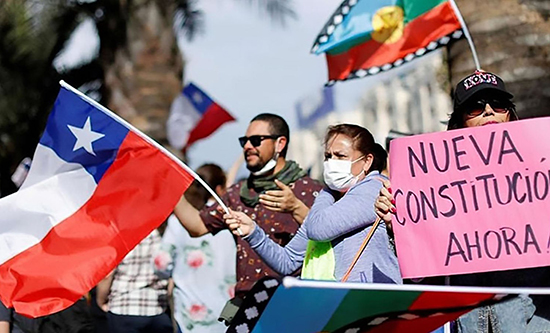
The victory of Gabriel Boric in the second round of the Chilean presidential election on 19 December represents a significant step forward for the Chilean working class. The scale of his majority was unexpected given that his opponent, the far right-wing populist Jose Kast, had secured more votes than Boric in the first round held on 21 November (28% vs 26%). However, a much-increased turnout in the second round saw Boric’s vote increase from 1.8 million to 4.6 million, giving him nearly a million more votes than Kast. Even then, turnout was just 55%. ROBERT CLARIDGE reports.
In the first round Kast had secured the support of the petit bourgeoisie who looked nostalgically back to the Pinochet dictatorship and the protection it had given to their interests against those of the working class. Terrified at the possible consequences of the massive struggles that had rocked the country from 2019, and unable to influence the outcome of a newly-established Constituent Assembly, this layer voted for the son of Nazi party member, an avowed admirer of Pinochet, and a fundamentalist Catholic completely opposed to abortion and the recently-approved Same Sex marriage law. However, this provided an insufficiently broad social base even with the support of some votes from right-wing candidates who lost in the first round, and the additional one million people who voted in the second round clearly went for Boric.
After initial nervousness, the Chilean ruling class was reconciled to Boric’s victory, not just because his programme represented no immediate threat to the foundations of its wealth – the Chilean mining industry – but because a victory for Kast would have brought with it the prospect of class war on a massive scale. Kast’s promise that he would ‘grant legal immunity to the armed forces and fund the legal defence of police officers accused of using excessive force; give the President sweeping powers to crack down on dissent; establish an International Anti-Radical Left Coalition; identify, arrest and prosecute radicalised troublemakers … [and] exit the United Nations’ would have brought him into an immediate conflict with the mass movement which had swept the country from October 2019 and which had forced the ruling class to concede a Constituent Assembly to re-write the 1980 Pinochet constitution.
While the massive protests that started in October 2019 against fare rises on the Santiago metro have died down, with the government using the Covid-19 pandemic to impose lockdowns and curfews, they achieved one of their key demands – the Constituent Assembly. A referendum in October 2020 overwhelmingly approved its establishment, and also overwhelmingly supported direct election of its delegates, with seats set aside for indigenous peoples. After a considerable delay, again attributed to the need to manage the pandemic, elections took place in April 2021, and the Assembly started its deliberations in October 2021 with a Mapuche woman, Elisa Loncon, elected as chair. Recognition of the land rights of the indigenous peoples, of whom the Mapuche are the overwhelming majority, will be critical to any constitutional settlement. Mapuche activists are regularly dismissed by the state and media as ‘terrorists’. In October 2021 President Pinera declared a state of emergency in parts of two southern regions of Chile, Bio Bio and Araucania, and sent 1,000 troops to support the paramilitary carabineros in an effort to destroy an increasingly militant resistance to the depredations caused by the Chilean logging industry.
As many commentators have pointed out, Boric is no Chavez or Morales. Indeed, Al Jazeera reported one London-based financial strategist as saying ‘His policy platform is not particularly radical. We’ve already priced in the risk of large deficits, but it won’t get out of control.’ In part this is because Boric’s Approve Dignity electoral alliance is in a minority within Congress. He has also sought to distance himself from Venezuela and Nicaragua, criticising what he regards as repressive measures towards opposition. He has promised fiscal responsibility, but even so, he will have to legislate substantial state intervention if he is to carry forward his ambition to dismantle Chile’s appalling private pensions system, to create 500,000 jobs for women, reform the privatised education and health sectors and tackle inequality. His recognition of indigenous and LGBTQ+ rights will bring him into conflict with the racist, homophobic and machist culture of the ruling class. And while he has promised higher taxation of the mining industry to support his social programme, the monopolies that dominate it have plenty of tools at their disposal to rein him in, from investment strikes to capital flight.
Critical in the coming period will be whether or not street mobilisations continue to ensure that the working class can challenge economic or political sabotage and back the progressive elements of Boric’s programme. Boric’s election, the Constituent Assembly, neither would have been possible without the enormous struggles of 2019. Any step back now will allow imperialism to recover ground it has lost: what has been gained on the streets can only be lost in the labyrinth of bourgeois parliamentarianism.




